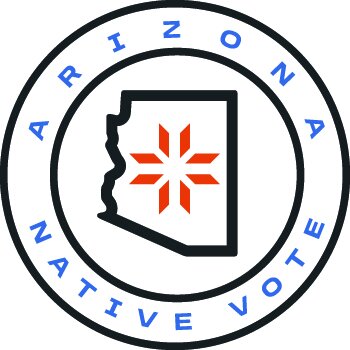Spotlight on Triston Black: Leading the Way in Indigenous Democracy Education
Triston Black presents at the Indigenous Democracy Symposium on Oct. 30, 2024, at the Navajo Nation Museum in Window Rock, Arizona.
Triston Black has been a driving force behind the Indigenous Democracy Class, an initiative aimed at engaging young Native voters on the Navajo Nation, Hopi Tribe, and White Mountain Apache Tribe lands, as well as in neighboring communities. His work with the Arizona Native Vote team is reaching over 6,000 high school students in rural and tribal areas across Navajo, Apache, and Coconino counties. These sessions aim to educate students on the importance of civic engagement, instill the value of voting, and empower them to actively shape their communities.
Triston’s curriculum is dynamic, covering core aspects of voter education across four visits. In Visit 1, students learn about the impact of Arizona Native Vote and the importance of civic engagement. Visit 2 dives into the logistics of voter registration and ballot comprehension, while Visit 3, “Government and Policy 101,” uses interactive activities like the "Human Policy Spectrum" to make policy relatable. The final visit is held post-election, allowing students to reflect on their voting experiences and celebrate collective civic participation. Triston explains, "The spectrum activity allows students to physically engage with policy statements and see how their views align or differ with peers, promoting a sense of unity and understanding."
Triston Black, left, was among the presenters at the Indigenous Democracy Symposium.
The program also incorporates traditional knowledge through the Diné framework. Each visit builds on this Indigenous approach: Nitsáhákéés ("to think"), Nahat’á ("to plan"), Iiná ("to act"), and Siih Hasin ("to reflect"). This grounding in cultural values helps students see democracy through an Indigenous lens, making civic engagement a powerful and culturally resonant experience.
Young Native voters have responded enthusiastically to this program, says Triston, noting the growing excitement among students to discuss voting and advocacy. "They’re gaining confidence in their voice and their ability to mobilize family members to vote. We’re seeing a newfound pride and responsibility among youth to be Indigenous Democracy Warriors, defending the right to vote and shaping their communities," he shares.
For long-term impact, Triston hopes the program will foster a generation of informed, active voters, continuing the work of Indigenous leaders who paved the way. Triston believes that through education, kinship, and commitment, these young voices will not only elevate civic participation but help define the future of their communities.



